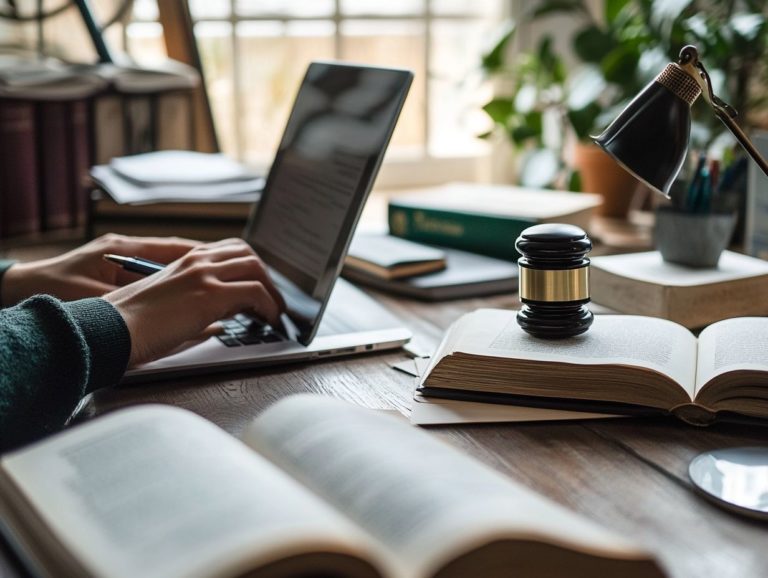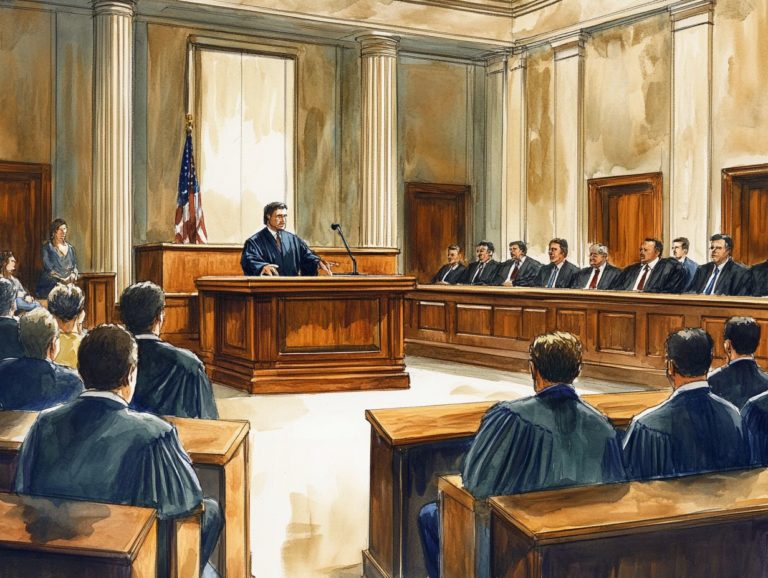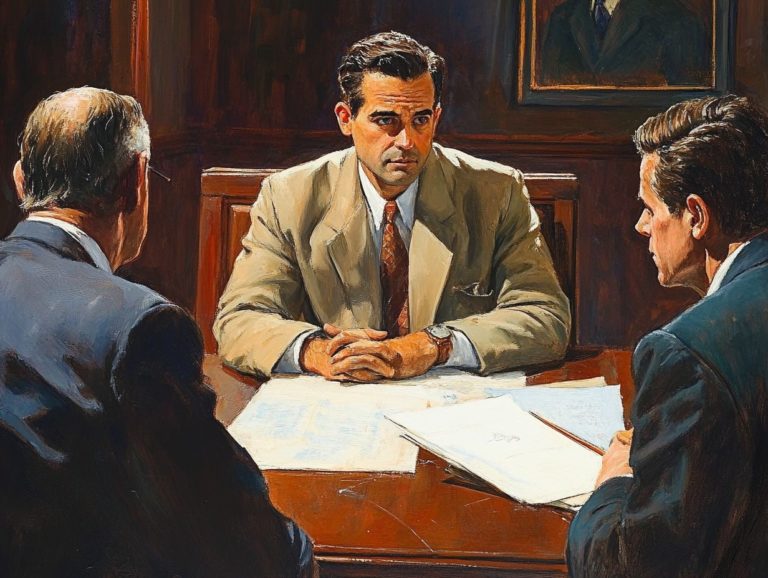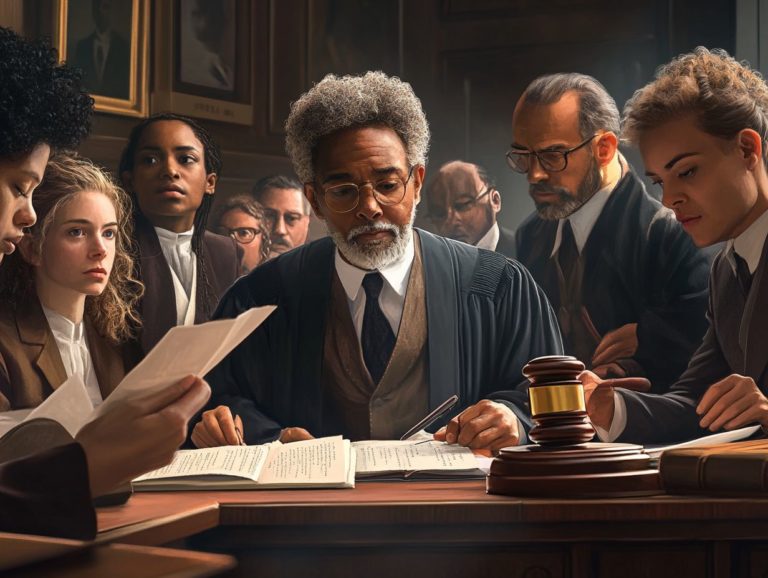How to Approach a Criminal Defense Case?
Navigating the complexities of criminal defense cases can feel overwhelming, whether you’re facing charges or trying to understand the legal process.
This article explores the different types of criminal cases and highlights the crucial role that defense lawyers play. It offers insights into essential preparation strategies, the trial process, and what you can expect regarding potential outcomes.
By the end, you ll gain a clearer understanding of how to approach a criminal defense case with confidence and clarity.
Contents
- Key Takeaways:
- Understanding Criminal Defense Cases
- Roles and Responsibilities of a Criminal Defense Lawyer
- Preparing for a Criminal Defense Case
- The Trial Process
- Possible Outcomes and Next Steps
- Frequently Asked Questions
- What is the first step in approaching a criminal defense case?
- How do I build a strong defense strategy for a criminal case?
- Can I represent myself in a criminal defense case?
- How do I choose the right criminal defense lawyer for my case?
- What should I do if I am facing criminal charges but am innocent?
- What happens if I am found guilty in a criminal defense case?
Key Takeaways:
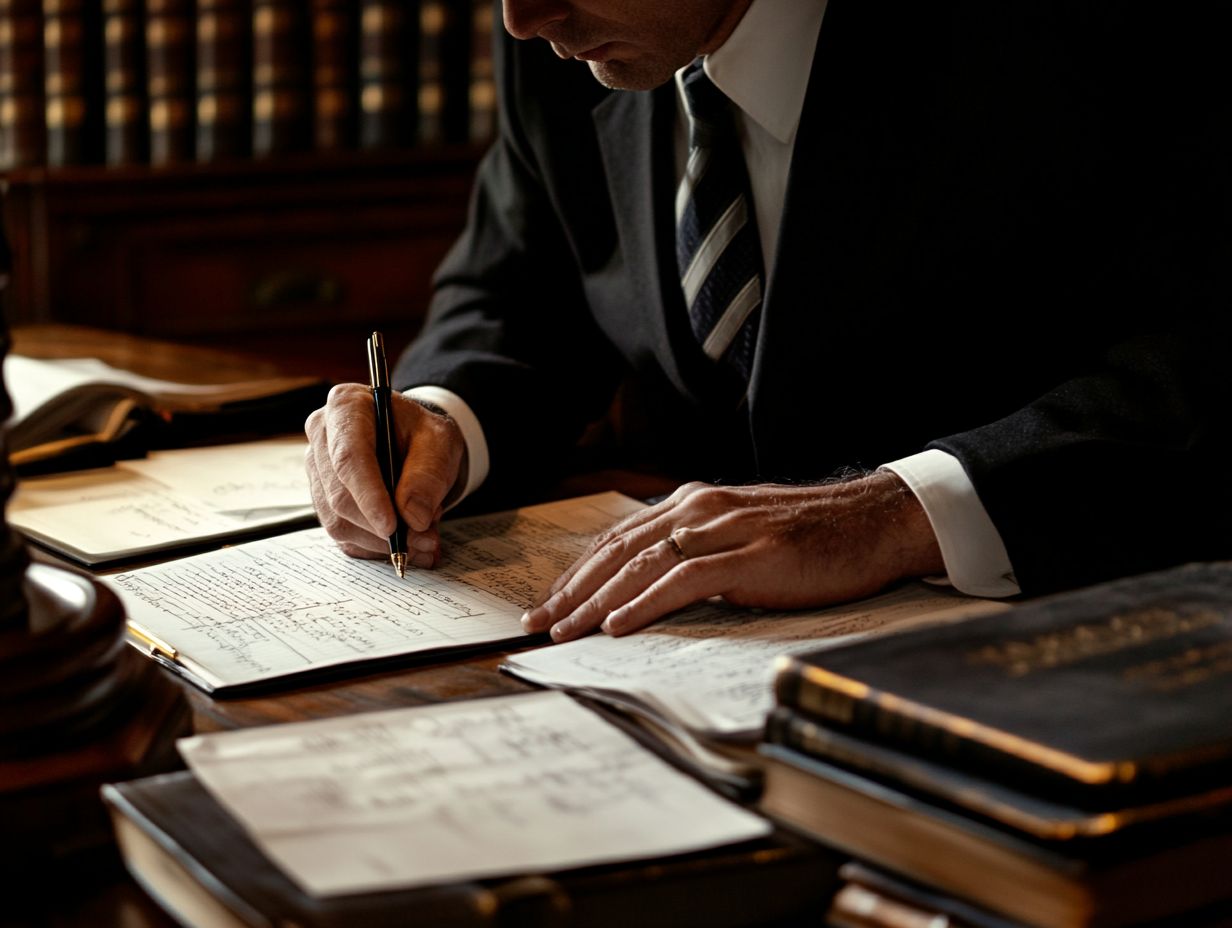
Criminal defense cases come in different types, and understanding each one is crucial in building a strong defense. A criminal defense lawyer has important tasks and strategies to fulfill in order to provide the best defense for their client. Effective preparation, including gathering evidence and understanding the trial process, can greatly impact the outcome of a criminal defense case.
Understanding Criminal Defense Cases
Grasping the details of criminal defense cases is crucial for anyone facing criminal charges. It s a landscape defined by a complex interaction of legal principles, rights, and courtroom strategies.
Criminal defense isn t just a set of tactics; it s a shield designed to protect the interests of the accused, ensuring effective legal representation and upholding due process, which means fair treatment through the legal system.
In Raleigh, North Carolina, you ll find seasoned attorneys like John Fanney from Spolin Law, who excel in maneuvering through the complicated world of criminal justice. Their focus is unwavering: achieving a favorable outcome for clients despite the challenges that trial proceedings can present.
Definition and Types of Criminal Cases
Criminal cases fall into two primary categories: felony charges and misdemeanor charges, each signifying different levels of seriousness and potential consequences within the legal framework.
Felonies are serious crimes that can lead to long prison sentences, while misdemeanors are less serious offenses with lighter penalties. Felonies represent the more grave offenses, carrying substantial penalties that could include lengthy prison sentences, hefty fines, or a combination of both. In contrast, misdemeanors are viewed as less severe, often resulting in shorter jail terms or lighter fines.
For instance, felonies can encompass violent crimes like murder or armed robbery, whereas misdemeanors often involve lesser offenses such as petty theft or simple assault.
Grasping these distinctions is essential for anyone navigating the criminal justice system whether you’re a defendant striving to build a strong defense or part of the prosecution team aiming to establish guilt.
Roles and Responsibilities of a Criminal Defense Lawyer
The roles and responsibilities of a criminal defense lawyer encompass much more than just legal representation; they are dedicated to safeguarding your rights and freedoms, deftly navigating the complicated world of criminal law, and employing robust defense strategies.
A strong attorney-client relationship is key. An experienced attorney must cultivate a strong relationship, fostering open lines of communication to collaboratively craft a defense plan tailored specifically to the unique details of your case.
Key Tasks and Strategies

Key tasks and strategies that you, as a defense attorney in criminal cases, will employ revolve around a variety of trial tactics designed to challenge the prosecution’s case while strengthening your defense through the effective presentation of legal evidence.
This process often begins with meticulously gathering evidence aimed at undermining the prosecution’s arguments. This may include witness statements, expert testimonies, and documentation that unveils crucial details about the case.
You will also prepare motions to dismiss charges, arguing that the evidence against your client is insufficient. Assessing the credibility of witnesses is paramount, as it allows you to spotlight inconsistencies in testimonies that may cast doubt on the prosecution s narrative.
Through these strategic actions, you work diligently to construct a compelling case that safeguards the rights of the accused.
Preparing for a Criminal Defense Case
Preparing for a criminal defense case requires you to engage in meticulous evidence analysis, strategic planning, and a thorough understanding of the criminal trial process.
Effective preparation is essential for crafting the most effective defense for your client. Your efforts lay the groundwork for a solid defense strategy, ultimately influencing the outcome of the trial in profound ways.
Gathering Evidence and Building a Strong Defense
Gathering evidence and building a strong defense are essential elements of an effective criminal defense strategy. This process demands the expertise of a qualified defense attorney who excels in evidence analysis and courtroom presentation.
You can collect various types of evidence, including physical and demonstrative evidence, each playing a vital role in framing the case.
- Physical evidence, like fingerprints or DNA, provides concrete support.
- Demonstrative evidence offers visual or illustrative representations that make complex information easier for juries to understand.
A skilled defense attorney expertly utilizes these forms of evidence to craft a compelling narrative that resonates in the courtroom. Their advanced qualifications and experience in scrutinizing evidence ensure every detail is thoroughly considered. This attention to detail is crucial for undermining the prosecution’s arguments and achieving a favorable outcome for you.
The Trial Process
The trial process is a carefully organized series of steps designed to ensure fairness and justice. It includes essential components such as:
- jury selection
- opening statements
- closing arguments
All of these elements work together to lead to the judge s ruling or the final verdict of the trial.
Important Steps and Considerations

Important steps in the trial process involve grasping the intricacies of the prosecution’s case, understanding the burden of proof, and embracing the principle of reasonable doubt.
These elements shape the legal landscape and influence the outcome of a criminal trial. They guide how you construct your defense strategy and respond to allegations.
By carefully dissecting the prosecution’s arguments, you can identify weaknesses and develop effective counterarguments. The burden of proof lies squarely with the prosecution; they must substantiate their claims with credible evidence beyond a reasonable doubt.
This crucial requirement emphasizes the presumption of innocence and gives you the power to spotlight any gaps or inconsistencies within the prosecution’s narrative. These considerations are vital to ensuring a fair trial, reinforcing the fundamental legal principles that uphold justice.
Possible Outcomes and Next Steps
In a criminal defense case, you may encounter a range of possible outcomes, from a plea deal to case dismissal or even a potential criminal conviction.
Each scenario carries substantial implications for you and your future, making it crucial to navigate this landscape with care and strategic foresight.
What Happens After the Trial?
After the trial, several important processes unfold, including the possibility of sentencing, the appeal process, and considerations related to attorney-client privilege that protect communications between you and your Raleigh Criminal Lawyer.
These pathways are vital next steps as you navigate the aftermath of a court decision.
You might consider filing post-trial motions to challenge the verdict or seek a reduction in your sentence. These actions can drastically influence your future.
If the trial outcome doesn t go your way, the appeal process opens a door to seek a review from a higher court, potentially leading to the original judgment being overturned.
It is crucial for you to work closely with your legal representative during this period. Knowing what each step means can help you plan your next move, ensuring that every available option is thoroughly explored.
Frequently Asked Questions
What is the first step in approaching a criminal defense case?

The first step is to gather all necessary information and evidence related to the case. This includes police reports, witness statements, and any other relevant documents.
How do I build a strong defense strategy for a criminal case?
A strong defense strategy involves analyzing the evidence, identifying weaknesses in the prosecution’s case, and crafting a compelling argument that highlights your innocence or lack of criminal intent.
Contact your defense attorney today to discuss your case!
Can I represent myself in a criminal defense case?
Yes, you can represent yourself in a criminal defense case. However, hiring a professional lawyer greatly improves your chances of a successful outcome.
How do I choose the right criminal defense lawyer for my case?
Focus on the lawyer’s experience, success rate, and reputation. You should feel confident and comfortable communicating with them.
What should I do if I am facing criminal charges but am innocent?
If you’re innocent, gather evidence and witness statements that support your case. It’s essential to have a skilled criminal defense lawyer to help prove your innocence and protect your rights.
What happens if I am found guilty in a criminal defense case?
If found guilty, you may face fines, probation, or jail time. A good lawyer can negotiate changes to your sentence or even appeal the verdict.

